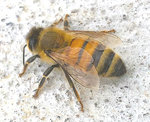Clear, 55° F
Powell resident Steve Nickles is a beekeeping hobbyist, but the city’s nuisance laws explicitly forbid the practice within city limits.
Nickles approached the city council on Jan. 20 to see …
This item is available in full to subscribers.
The Powell Tribune has expanded its online content. To continue reading, you will need to either log in to your subscriber account, or purchase a subscription.
If you are a current print subscriber, you can set up a free web account by clicking here.
If you already have a web account, but need to reset it, you can do so by clicking here.
If you would like to purchase a subscription click here.
Please log in to continue |
|


Powell resident Steve Nickles is a beekeeping hobbyist, but the city’s nuisance laws explicitly forbid the practice within city limits.
Nickles approached the city council on Jan. 20 to see if the ordinance could be amended to permit small-scale, non-commercial beekeeping.
“This is not a money maker for me,” he told the council.
Having little knowledge of the practice or issues involved, the council tabled the request but took it up again at the following meeting, on Feb. 3. Feeling they still needed to consider some issues before amending the city’s restrictions, the matter remains under councilors’ review.
Nickles presented copies of ordinances from Casper and Cheyenne, which allow hobby beekeeping under a number of restrictions.
Casper’s ordinance requires the beekeeper to have a flyway to force bees to fly at least 6 feet above the property as they come and go from the hive. It also requires hobbyists to provide the bees with a water source so they don’t congregate around pools and other neighborhood water sources.
Cheyenne’s regulations refer beekeepers to the state’s agricultural statutes, which limit the density of beekeepers within a given area, require annual registration and saddle beekeepers with a number of other restrictions.
“It gets pretty complicated,” City Administrator Zack Thorington noted.
Councilors asked questions about how much the bees would travel and how that could impact neighbors; Nickles said the insects have a range of about 2 miles from the hive.
“They’re going to venture out,” he said.
Longtime Councilor Tim Sapp said the city originally banned beekeeping after complaints from neighbors, but Mayor John Wetzel suggested times may have changed.
“I personally don’t have any problem with people keeping a couple boxes in town,” Wetzel said, but he did want to see some restrictions in place.
He also said honey bees are not particularly aggressive. Wetzel’s brother is a beekeeper, and when he works on the hives, Wetzel has stood nearby without any protection.
“I feel the more bees, the better,” said Councilor Scott Mangold, adding, “they’re important.”
Councilor Jim Hillberry agreed that bees really help with pollination, but raised the concern about how beekeeping in Powell would impact people who are allergic to bee stings; Councilor Lesli Spencer said she’s among those who are allergic, and Councilor Floyd Young said he has family members who are “very allergic.”
Councilor Steve Lensegrav, an assistant principal at Powell High School, said teachers and administrators in the school district “worry about bee stings all the time.” Lensegrav said he really didn’t want to see more of the insects in town.
“To me it’s not worth the possible endangerment, even though it could be a tiny, small percentage,” he said, adding, “Yes, it’s great for pollination, but they’re going to find their way anyway.”
Another question raised was how much time would be required of city employees to monitor the practice, if it were allowed and the city enforced restrictions. However, the mayor pointed out the city has an ordinance that permits people to raise rabbits but there is hardly anyone doing it.
“I don’t think we’re going to see a rush of aviaries coming to town,” Wetzel said.
There were also questions about how the city’s mosquito spraying could kill the bees. Leafcutter bees are used across the Big Horn Basin for pollinating alfalfa. Currently, Park County Weed and Pest notifies commercial beekeepers when spraying will occur so they can protect their hives.
After the discussion of possible issues, councilors decided they wanted to get more information from experts from the Wyoming Department of Agriculture and others before proceeding with any change in the current city ordinance.